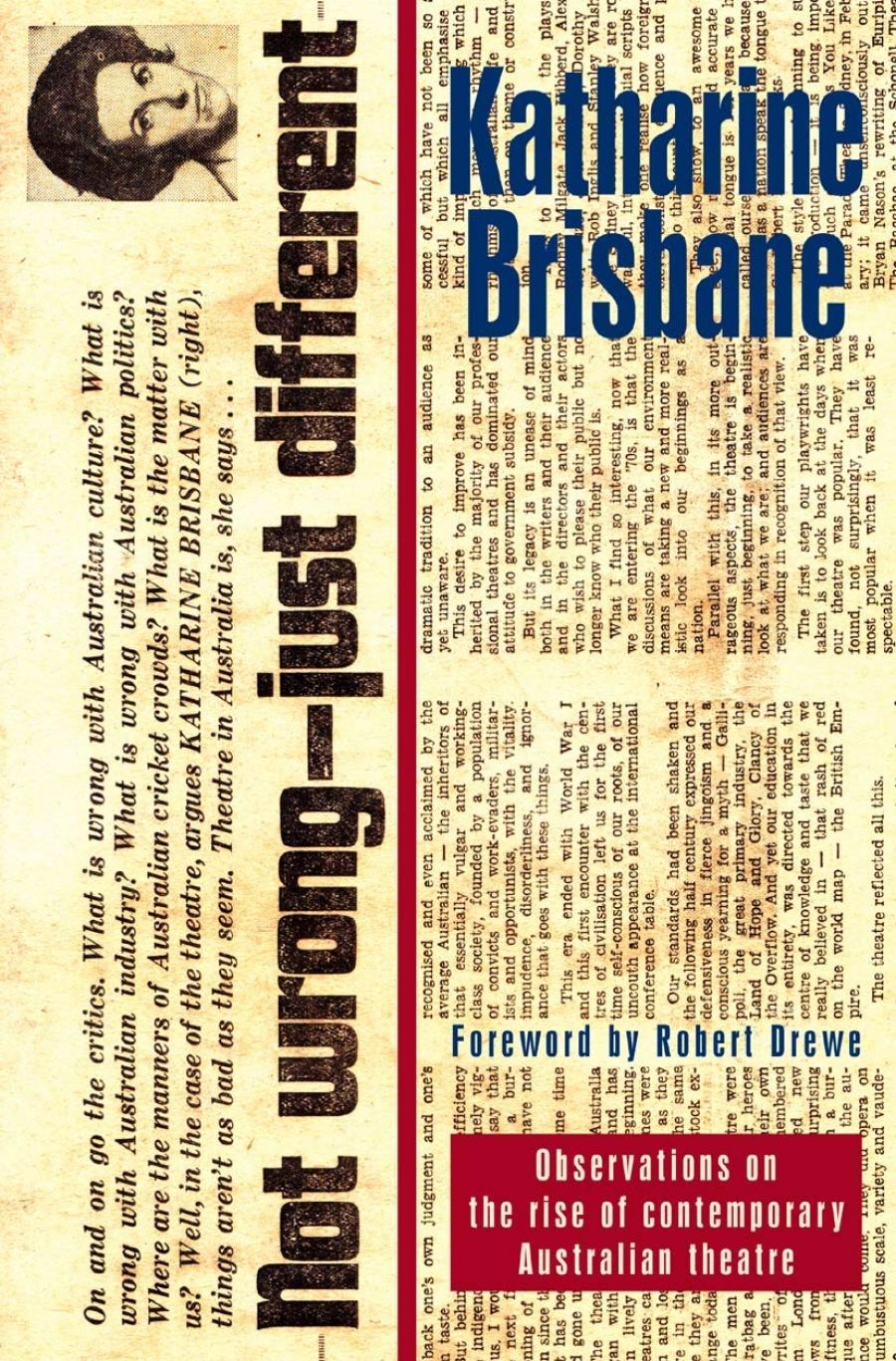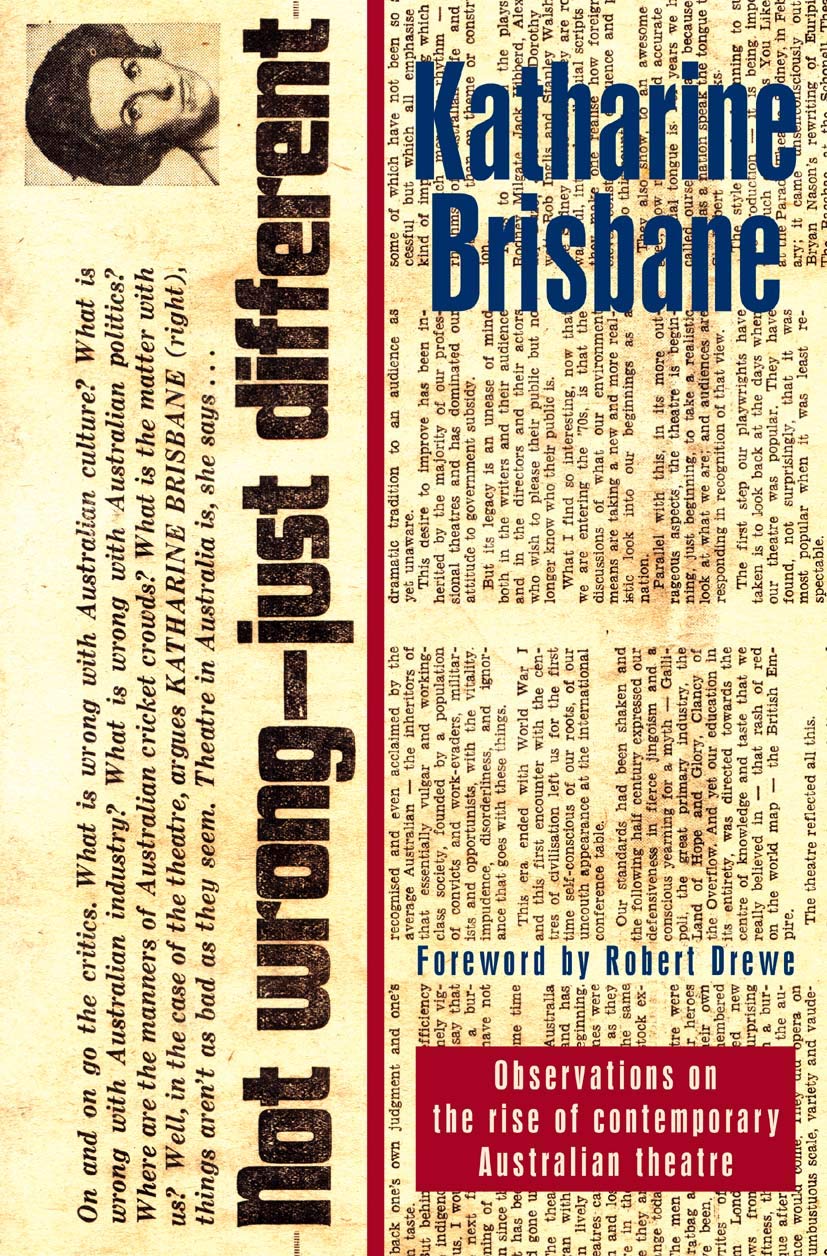
- Free Article: No
- Contents Category: From the Archives
- Custom Article Title: Avec teeth, avec taste, avec everything
- Review Article: Yes
- Article Title: Avec teeth, avec taste, avec everything
- Online Only: No
- Custom Highlight Text:
Imagine, if you will, the blessed child of a parthenogenetic conception involving the Oracle of Delphi and Cassandra. The girl has Cassandra’s clarity, passion and a good deal of her accuracy, combined with the Oracle’s high degree of credibility but without its duplicity. What could that girl grow up to become but a theatre critic and commentator, even if she had been raised in the 1930s, in the world’s most isolated capital city? Please note, before returning to mundane reality, how diminished the myth of Cassandra would be without the Trojan War, and how little we would care for the writhing of the Pytho, the priestess at Delphi, if Oedipus had not consulted her. A public voice needs subject matter that is at once contemporary and timeless if its utterances are to transcend the ephemeral.
- Book 1 Title: Not Wrong – Just Different
- Book 1 Subtitle: Observations on the rise of contemporary Australian theatre
- Book 1 Biblio: Currency Press
- Book 1 Cover Small (400 x 600):

- Book 1 Cover (800 x 1200):

Katharine Brisbane’s Trojan War had as its besieging generals the Australian Performing Group in Melbourne and Sydney’s Nimrod Theatre Company. Behind the barricades, as it were, Dr H.G. (‘Nugget’) Coombs marshalled as best he could the federal government’s cultural resources, some of them the modern-day equivalent of bullion.
Brisbane has evoked a far-fetched opening image rather than that of Homer because, being female, she eschewed the role of glorifying bellicose heroes, preferring to pursue the truth of the conflicts of her time, both on stage and off. One of the signal services to our recent cultural history rendered by this book is its ineluctable building of a coherent entity from the competing, flawed and often mutually antagonistic elements that constitute it.
Katharine Brisbane became theatre critic for the West Australian in 1959, and was national writer on theatre for the Australian from 1967 to 1974. With her late husband, Philip Parsons, she founded Currency Press in 1971. She was an occasional writer for Theatre Australia, and wrote for the Fairfax publication the National Times during 1980–82. ‘These [latter] were periodicals, and the emphasis was no longer on bringing the news but in joining the debate’, as she remarks. Excerpts from occasional addresses through the 1980s and 1990s complete this selection, which is in seven sections. It is contextualised by intermittent authorial comments written as the typescript was prepared for the press. The wisdom of hindsight enjoyed by these comments no doubt prompted my initial ancient Greek fantasy.
Forty years on, the Brisbane–Kippax era – H.G. Kippax’s first reviews for the Sydney Morning Herald appeared in the year before Brisbane joined the Australian – now seems like a classic age. There were giants in those days, and both of these newspaper critics were among them. Brisbane begins her seven sections, like Seven Ages of Man (homo ludens Australiensis, no doubt) in a lively manner with ‘report and opinion on the erupting political climate’ of 1967–68. At the end of the sixth section (1985), her final pieces are headed ‘Death of the Pram Factory’ and ‘Final Curtain for Nimrod?’. Reading about death throes gives pleasure only to ghouls, so Brisbane adds a positive postscript to the last rites of the APG at the Pram, listing alumni ‘who have since made their name in other fields’. They include Greig Pickhaver, Lindy Davies, Helen Garner, Sue Ingleton, Jane Clifton and Carmen Lawrence. In detailing Nimrod’s evolution from being ‘a happy-go-lucky, inward-looking theatre company’ to ‘taking upon itself the burdens of the world’, Brisbane discusses the appointment of Aubrey Mellor as John Bell’s co-artistic director. She writes of Mellor’s lovingly studied productions at the Jane Street Theatre, where his direction showed a care for the text and for actors’ detail. Actors immediately flourished under him at Nimrod: George Whaley’s devastating performance as the mad investigator in Dario Fo’s Accidental Death of an Anarchist; Barry Otto’s three astonishing performances in different stories of betrayal in Václav Havel’s Protest; any number of performances in a production of Three Sisters that has deservedly become a Sydney legend. Yet, in less than four years, Mellor and Bell would be gone from the dying Nimrod.
From her unique standpoint – she had assessed the pinnacle production in both cities – Brisbane surprises us in Sydney by praising George Ogilvie’s 1968 MTC production of Chekhov’s masterpiece more highly than Mellor’s. In 1972 she made an even more pointed com-parison of the Pram Factory’s 1971 production of David Williamson’s Don’s Party with its subsequent Jane Street realisation, under the direction of John Clark.
At the APG, wild language, a bohemian air and erratic performances imprinted themselves on Brisbane. At Jane Street, the play ‘reveals not only the stunning wit but a great warmth which has not before emerged from Williamson’s work’. That, and the judgment that Williamson writes not satirically but with ‘unshockable compassion’, may read like a superannuated opinion to the noughties generation. So be it. Here is Brisbane’s comment, added in 2005: ‘The mentoring David Williamson received during this production set him on the path of the “Williamson play” as we know it today.’
Brisbane was at her feistiest in her early judgments on Nugget Coombs, the Australian Elizabethan Theatre Trust and the Australian Council for the Arts, later the Australia Council. These were his creations. Towards the end of 1967, she concluded a stinging analysis with: ‘Take back Dr Coombs, Mr Gorton, and give us a Diaghilev.’ This is as racy and entertaining as anything in the book. She recants in the introduction (much later): ‘I came to regard him with great affection’ and ‘We owe him a great debt’. Amen to that.
One of the most telling judgments in the book begins: ‘It is certainly the most shattering two hours I can remember spending in the cinema.’ She is referring to the film made of Peter Brook’s Royal Shakespeare Company production of Marat/Sade, shown at the Perth Festival in 1968. ‘The play … is probably the major theatrical document of despair which has yet emerged from the decadent 1960s.’ Sound theatre criticism, but hardly surprising. But she follows it with: ‘It is a celebration of the repeated pattern of high ideals and venal execution which has been the shape of history, and of the belief that nothing is so bad that we are not capable of it.’ This is vintage Brisbane: provocative, articulate and ultimately irrefutable. A little later, in reviewing the furore aroused in Sydney by Brian Syron’s production of a Canadian prison play, Fortune and Men’s Eyes, recommended by Darcy Dugan, a notorious serial escapee, Brisbane wrote: ‘The theatre’s role in a public matter like this is a simple one – to raise it and to find a way of involving people. Its job is not to find solutions.’
As a civilised but persistent framer of newly relevant questions, and altogether intolerant of comfortable old answers, Katharine Brisbane, publisher and commentator, continues to wield an authority in Australian theatre that can now be won only by practitioners. Neil Armfield is among those who have earned it, but his contribution falls outside the book’s scope. Still, at the very moment when the 24-year-old Armfield arrived at Nimrod, Brisbane voiced this cri de coeur:
We are in decay in this country … swaggering self-centredness and acquisitiveness consume our thinking in government, in business, in daily life. Mateship has given way to monetarism, the fair deal to the massive tax evasion industry … we prey on those unable to defend themselves … For the moment our novelists are better documenters of the state of the nation than our playwrights.
This Cassandra-like proclamation seems even truer in 2006, but Brisbane retains hope. In his seventh and final Age, Shakespeare’s melancholic Jaques saw Man as ‘sans teeth, sans eyes, sans taste, sans everything’. In Brisbane’s seventh and final section, entitled ‘Retrospection’, she continues tough-minded but grows sanguine. Both are non-sclerotic qualities to be cherished in an elder of the tribe.


Comments powered by CComment